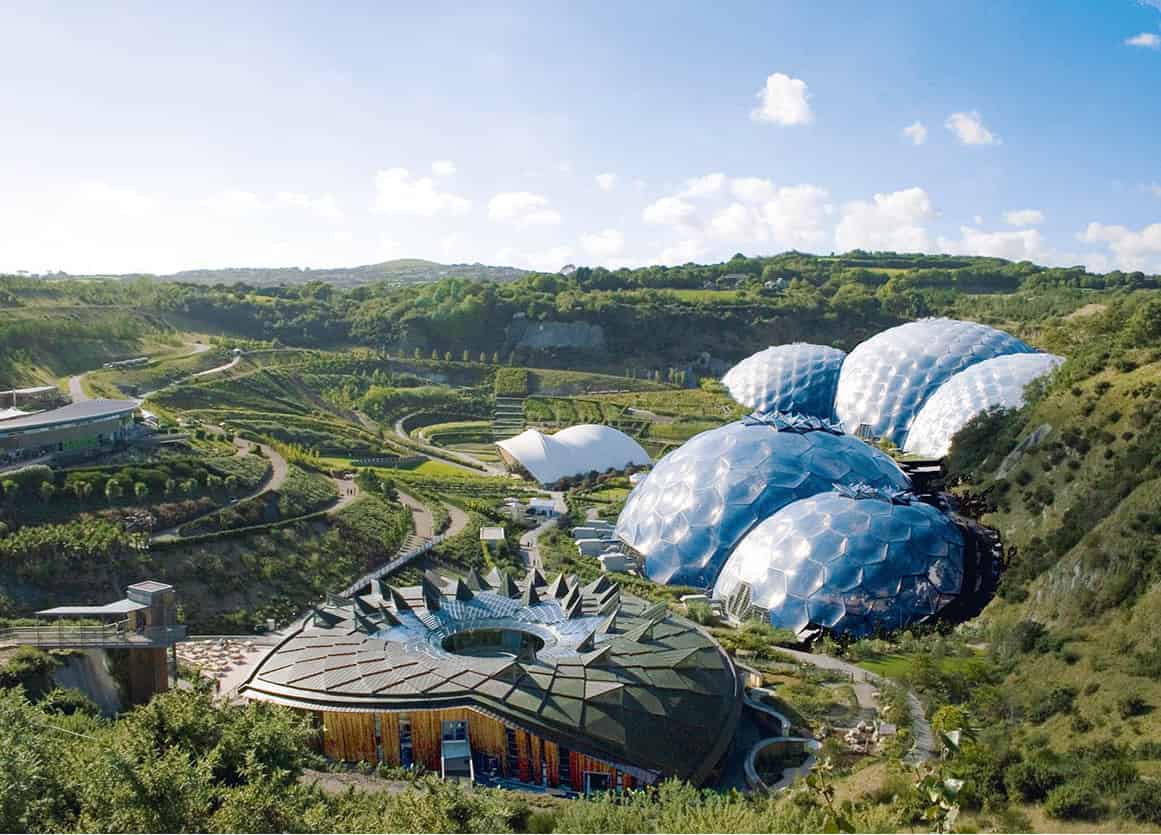When music producer Tim Smit inaugurated his giant conservatories, the biomes, he, along with an influx of new industries and large investments, ushered in a new era in Cornwall’s history.
Green technology
‘The decline of industry in the 19th century affected Cornwall in a profound way,’ explains chief executive Smit. When mining died it created a melancholy mood. But because of Cornwall’s historical links with industry it was ready to embrace new technology, particularly green technology. What blossomed turned out to be a dawning of a post-industrial revolution.
The project, a 35-acre (14-hectare) site in a disused clay pit, has transformed one of the few unattractive areas of Cornwall into a place everybody wants to visit. It is a vast global garden, incorporating huge, dome-shaped biomes that resemble a surreal space station made of bubble-wrap.

Fun plant sculptures help to make this a family-friendly attraction.
Tamsyn Williams
Eden Information
The First bus 101 service connects the Eden Project with St Austell station; admission ticket discounts are available if you arrive by public transport. A discount is also offered on bookings made online in advance, enabling you to get in faster on busy days. While this doesn’t avoid the queues to get into the car parks, these have improved since the system was streamlined.
On arrival, you are shepherded into one of the car park tiers, which are ‘fruit coded’ – from cherries and plums near the top to apples at the bottom; a park and ride system operates from the higher levels. There’s an informative Visitor Centre, a large shop and several good cafés and restaurants, with lots of outdoor seating, as well as a little ‘landtrain’ pulled by a tractor run on biofuel that ferries people between the Visitor Centre and the biomes. For further information, and details of a packed year-round schedule of events (including ice-skating in winter), tel: 01726-811 972, or visit www.edenproject.com; daily June–Oct 9am–8pm, Nov–May 9.30am–6pm, with exceptions; last entry 30 minutes earlier.
Biomes and Beyond
In the Rainforest Biome, the world’s largest greenhouse, full of tropical plants, there is much to be learned about the coffee, banana and spice industries on mini plantations.
Inside the giant Mediterranean Biome, which re-creates the landscapes of the Mediterranean, California and South Africa, and the outdoor gardens, the crops – from olives and grapes indoors to hemp and sunflowers outside – are flourishing. And various growing systems are illustrated with models.
It is a place with serious environmental ambitions and there’s a strong emphasis on education. Environmental lectures are conducted in the biomes, and The Core education centre, based on the structure of a sunflower, is designed according to Fibonacci’s sequence, one of nature’s basic building blocks, using fully sustainable materials. On the lower floor interactive displays show how plant energy powers the world and their ecosystems provide goods and services.
Kids Zone
The landscape at Eden is engineered to encourage curious young minds to explore their creativity in a playful way, with specific features and attractions dotted about to attract children (and adults) of all ages.